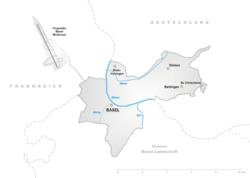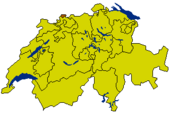Basel-City
| Basel-Stadt | |||
|
|||
| Capital | Basel | ||
| Population (2007) | 185,227 (Ranked 15th) | ||
| - Density | 5071 /km² | ||
| Area | 37 km² (Ranked 26th) | ||
| Highest point | 522.19 m - St. Chrischona | ||
| Lowest point | 244.75 m - Rhine shore, national border at Kleinhüningen | ||
| Joined | 1501 | ||
| Abbreviation | BS | ||
| Languages | German | ||
| Executive | Regierungsrat (7) | ||
| Legislative | Grosser Rat (130) | ||
| Municipalities | 3 municipalities | ||
| Districts | n.a. | ||
| Website | www.BS.ch | ||
 |
|||
Basel-City (in German: Basel-Stadt) is one of the 26 cantons of Switzerland. The city of Basel and the municipalities of Bettingen and Riehen form its territory.
Contents |
History
The canton of Basel-Stadt was created when the historic canton of Basel was divided in 1833. The result of this division was two half cantons: Basel-Stadt and Basel-Land. The division itself was caused by the canton of Basel-Land, and the constitution of Basel-Stadt does not recognize the other half canton.
Geography
The canton of Basel-City is located in the north of Switzerland. It borders Germany and France to the north, and Basel-Landschaft to the south. Basel is located at the so called 'knee' of the River Rhine, at the point where from the west the little Birsig River joins the Rhine from the left, and where the Rhine itself switches from flowing in a westerly direction to a northerly flow.
The area of the canton is 37 km². This makes Basel-City the smallest canton in Switzerland.
The population of the canton is 185,227 (2007) of which 56,106 (or 30.29%) are foreigners[1].
Politics
Basel-Stadt is a half canton. This means that the canton only sends one representative to the Council of States. The capital of the canton Basel-Stadt is the city of Basel. The present constitution of the canton dates from 1889.
The parliament of the canton is called Grosser Rat and has 130 members who are elected for four years at a time. There are currently (2006) eight different political parties represented in the parliament.
The executive of the canton (Regierungsrat) is made up of seven members. Currently (2006) there are five different political parties represented in the executive.

Economy
The chemical industry and the pharmaceutical industry are of greatest significance in the canton. There are a number of multinationals in the city of Basel, attracting workers from both cantons of Basel and the areas across the border in France and Germany. Banking and finance are important as is the service sector in general. Small and middle-sized businesses employ a significant number of people, both in the city as the two municipalities.
Economically the neighbouring lands in Germany and France are not separated from the area of the canton of Basel-Stadt. Good transport links across the border as well as supportive local governments facilitate this link.
Culture

The carnival of the city of Basel (Basler Fasnacht) is a major cultural event in the year. The carnival is one of the biggest in Switzerland and attracts large crowds every year, despite the fact that it starts as early as four in the morning (Morgestraich). For more information see also [1]
The canton of Basel is renowned for two of its biscuits. The Basler Läckerli is a hard biscuit made of honey, almonds, candied peel and Kirsch and is enjoyed as a speciality all year round. The Basler Brunsli is made of almonds and generally enjoyed at Christmas all around Switzerland.
A famous cultural ambassador is the Basel Boys Choir.
Tourism
The fact that three nation- states come together in one spot near Basel (Dreiländereck) attracts some tourists. The site is clearly identified and a popular destination for primary school classes. The carnival attracts large number of people from across Switzerland and the neighbouring countries.
Events
The Basel Messe convention center is host to several international events. The largest are Art Basel, an art show for Modern and contemporary works; and BaselWorld, a major watch and jewellery show.
Transport

There is an international airport at Basel-Mulhouse. The canton is well connected by both trains and motorways to the rest of Switzerland and the neighbouring areas in France and Germany.
Basel is a major train station of Switzerland, connected to Paris, Brussels and Berlin with direct fast trains.
There is a port at Basel for ships on the river Rhine. This port is of great significance to landlocked Switzerland, as it offers the country's only direct connection to the sea. The port benefits from good connections to both rail and road.
External links
 Media related to Basel-City at Wikimedia Commons
Media related to Basel-City at Wikimedia Commons- City Guide (German)
- Citymap (German)
- Official Site (German)
- Official Statistics
- Basel (-Stadt) in German, French and Italian in the online Historical Dictionary of Switzerland.
- BaselArea
- Airport Basel-Mulhouse (French & German)
- Port of Basel
- Trams of Basel - history and future
- Webcams
- [2]
- [3]
References
- ↑ Bundesamt fur Statistik (Federal Department of Statistics) (2008). "Ständige Wohnbevölkerung nach Staatsangehörigkeit, Geschlecht und Kantonen" (Microsoft Excel). Retrieved on November 5, 2008.

